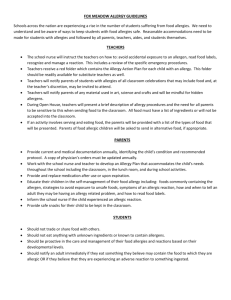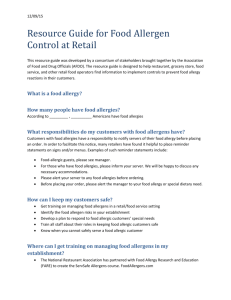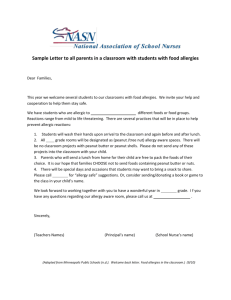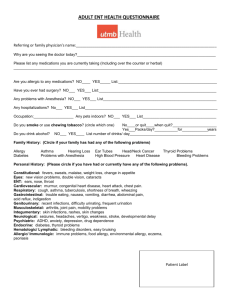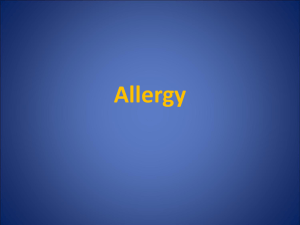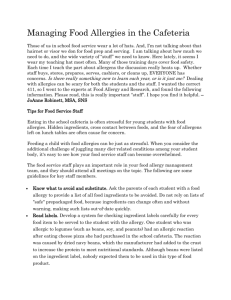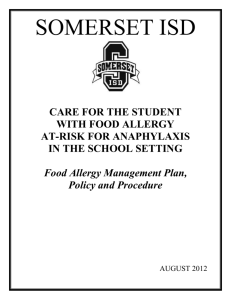Food Allergy Management Plan
advertisement
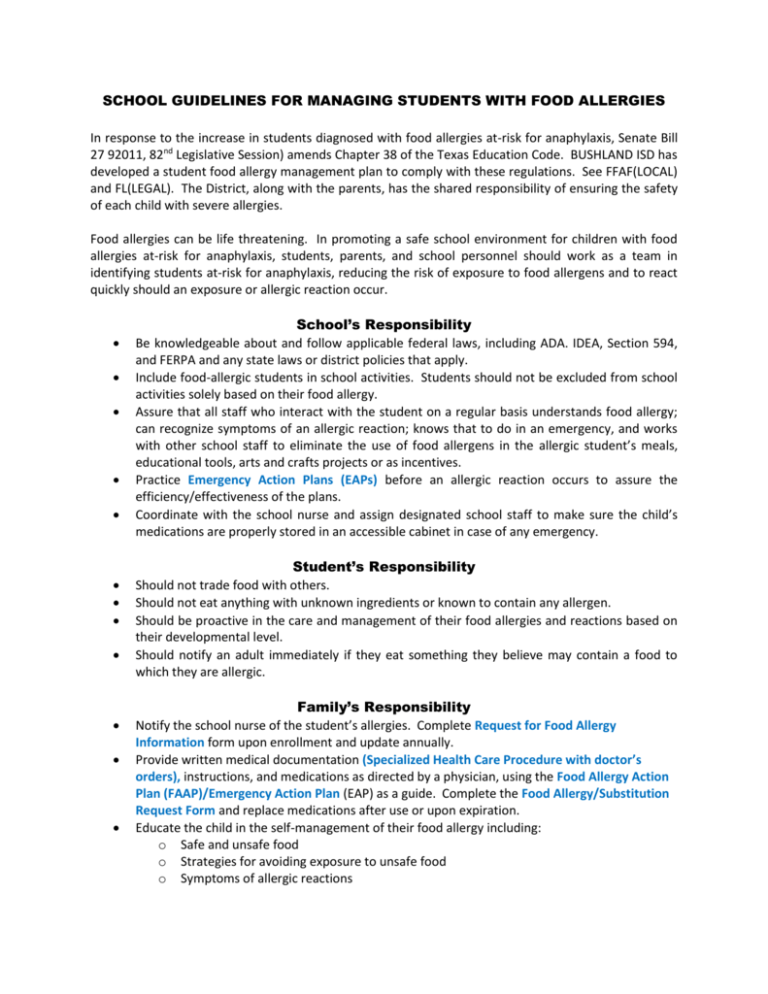
SCHOOL GUIDELINES FOR MANAGING STUDENTS WITH FOOD ALLERGIES In response to the increase in students diagnosed with food allergies at-risk for anaphylaxis, Senate Bill 27 92011, 82nd Legislative Session) amends Chapter 38 of the Texas Education Code. BUSHLAND ISD has developed a student food allergy management plan to comply with these regulations. See FFAF(LOCAL) and FL(LEGAL). The District, along with the parents, has the shared responsibility of ensuring the safety of each child with severe allergies. Food allergies can be life threatening. In promoting a safe school environment for children with food allergies at-risk for anaphylaxis, students, parents, and school personnel should work as a team in identifying students at-risk for anaphylaxis, reducing the risk of exposure to food allergens and to react quickly should an exposure or allergic reaction occur. School’s Responsibility Be knowledgeable about and follow applicable federal laws, including ADA. IDEA, Section 594, and FERPA and any state laws or district policies that apply. Include food-allergic students in school activities. Students should not be excluded from school activities solely based on their food allergy. Assure that all staff who interact with the student on a regular basis understands food allergy; can recognize symptoms of an allergic reaction; knows that to do in an emergency, and works with other school staff to eliminate the use of food allergens in the allergic student’s meals, educational tools, arts and crafts projects or as incentives. Practice Emergency Action Plans (EAPs) before an allergic reaction occurs to assure the efficiency/effectiveness of the plans. Coordinate with the school nurse and assign designated school staff to make sure the child’s medications are properly stored in an accessible cabinet in case of any emergency. Student’s Responsibility Should not trade food with others. Should not eat anything with unknown ingredients or known to contain any allergen. Should be proactive in the care and management of their food allergies and reactions based on their developmental level. Should notify an adult immediately if they eat something they believe may contain a food to which they are allergic. Family’s Responsibility Notify the school nurse of the student’s allergies. Complete Request for Food Allergy Information form upon enrollment and update annually. Provide written medical documentation (Specialized Health Care Procedure with doctor’s orders), instructions, and medications as directed by a physician, using the Food Allergy Action Plan (FAAP)/Emergency Action Plan (EAP) as a guide. Complete the Food Allergy/Substitution Request Form and replace medications after use or upon expiration. Educate the child in the self-management of their food allergy including: o Safe and unsafe food o Strategies for avoiding exposure to unsafe food o Symptoms of allergic reactions o o o How and when to tell an adult they may be having an allergy-related problem How to read food labels (age appropriate) If age appropriate, the importance of carrying and administering their personal asthma and anaphylaxis medications as prescribed Review policies/procedures with the school staff, the child’s physician, and the child (if age appropriate) after a reaction has occurred. Provide emergency contact information and update as needed. Work with the school nurse to develop a plan that accommodates the child’s needs throughout the school, including the classroom, in the cafeteria, after-school programs, school-sponsored activities, on the school bus, as well as the Food Allergy Action Plan. School Nurse’s Responsibility Participate in specialized training, provided by the District. Conduct case finding to identify students with food allergies or a history of anaphylaxis from sources including: Student/Family, Student Health History Form, Health Card/Medical Records, Student Information Form. Request further information from parent. Immediately after the diagnosis of a life-threatening allergic condition, meet with the student’s parents/guardian and develop an Individualized Health Plan. Responsible for the development, implementation, and monitoring of the District’s food allergy management plan. Obtain completed Specialized Health Care Procedure with doctor’s orders and Food Allergy/Substitution Request form from parent with orders from a physician/licensed prescriber for medication and the completed Emergency Action Plan/Food Allergy Action Plan to the Food Service Director and campus Cafeteria Manager. Assure that the FAAP/EAP includes the student’s name, photo, allergens, and symptoms of an allergic reaction, risk reduction procedures, emergency procedures and required signatures. Familiarize teachers with the FAAP/EAP of their students. Other staff members who have contact with the students should be familiar with their FAAP/EAPs and be able to intervene if needed. Document food allergies on student’s Health Card and Health Alerts on computer. Provide information about students with life-threatening food allergies and their photos (if consent is given by parent) to all staff on a need-to-know basis, including bus drivers. Conduct training and education to designated staff, as well as teachers, cafeteria, PE teachers, coaches and bus drivers regarding a student’s life threatening allergens, symptoms, risk reduction procedures, emergency procedures, and how to administer the epinephrine autoinjector. Implement a periodic anaphylaxis drill as part of a periodic refresher course. Educate new personnel and substitute personnel as necessary. Track in-service attendance of all involved parties to assure they have been trained. Introduce yourself to the student and show him/her how to get to the nurse’s office. Post district’s emergency protocol on district website and have available all FAAP/EAPs and IHPs in the nurse’s office. Periodically, or at least annually, check medications for expiration dates and notify parents to obtain new medications. Arrange periodic follow-up on a regular basis, to review the FAAP/EAP and IHP. Make sure there is a contingency plan in place in case there is a substitute school nurse. Meet with parents on a regular basis to discuss issues related to plan implementation. Ensure that a student suspected of having an allergic reaction is accompanied by a trained adult. Provide health education to the food allergic student as needed.
